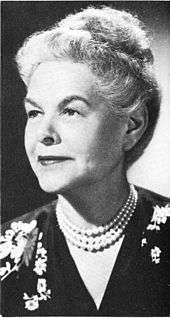Theresa Helburn

Theresa Helburn (January 12, 1887 – August 18, 1959)[1] was an important figure in 20th-century American theater and a Bryn Mawr College alumna, best known for her work with New York's Theatre Guild.

Involved with The Theatre Guild from its foundation in 1919, Helburn served first as a literary manager and then as casting director and eventually became (along with Lawrence Langner) a co-producer. The Theatre Guild specialized in bringing the highest-quality drama of Europe and America to Broadway stages. Breaking away from the common practice of single-ticket sales and productions built around famous stars, the Theatre Guild built a large and loyal season subscription audience as well as establishing enduring relationships with renowned playwrights such as George Bernard Shaw and Eugene O'Neill, as well as the actors Alfred Lunt and Lynn Fontanne, among many other notable names. She and the other founding members of this production company brought serious, ground-breaking plays back to the Broadway stage, and together they proved that it was possible to produce work that was both artistically and commercially successful.
Helburn's responsibilities were wide-ranging, including everything from vetting scripts, to casting plays, to fund-raising, to leading advertising and marketing campaigns. In 1925, just six years from the establishment of the production company, she presided over the ground-breaking ceremony for the new Guild Theatre. In the early 1930s, she worked briefly in Hollywood, and maintained strong ties with the film and television industries until the time of her death.[2]
A significant collection of theatrical ephemera, photographs, and writings relating to the life of Theresa Helburn and to the Theatre Guild is housed at Bryn Mawr College in College Collections and Special Collections.
Literature
- Theresa Helburn: A wayward quest. The autobiography of Theresa Helburn. Boston: Little, Brown 1960.
References
External links
- Theresa Helburn Theater Collection at Bryn Mawr College
- Frank, Glenda. "Theresa Helburn." Jewish Women: A Comprehensive Historical Encyclopedia. 1 March 2009. Jewish Women's Archive. January 5, 2010
- Works by or about Theresa Helburn at Internet Archive
- Works by Theresa Helburn at LibriVox (public domain audiobooks)
